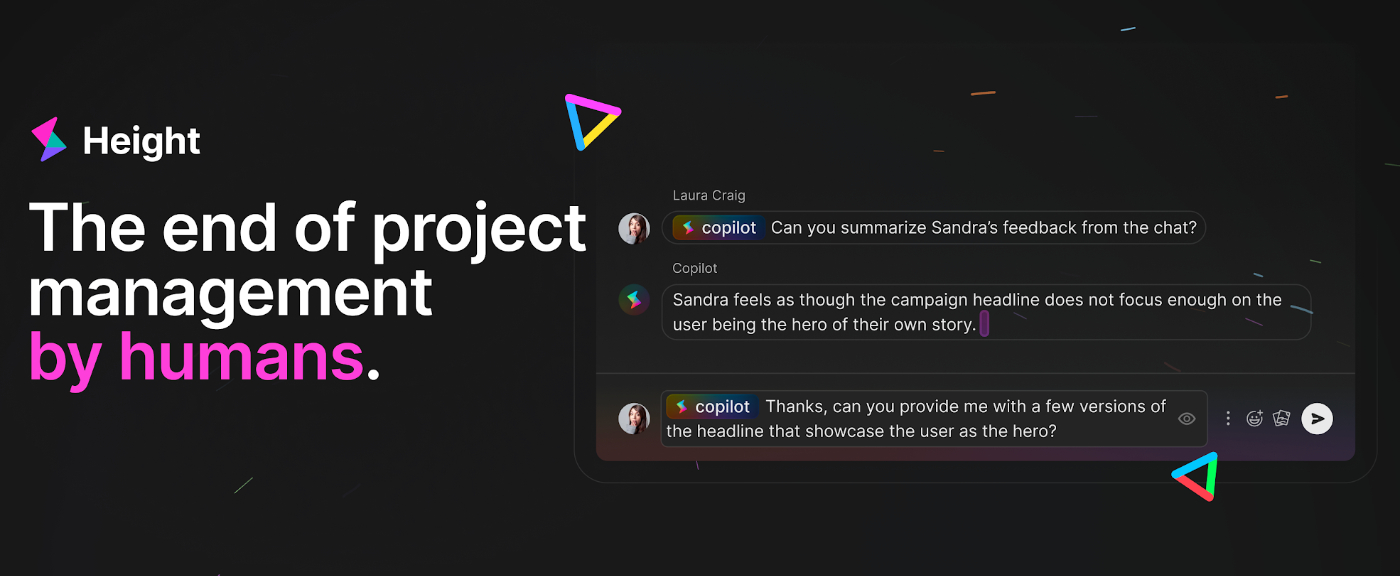
Sponsored By: Height
This essay is brought to you by Height, the first and only AI project manager.
Project management is necessary — it’s how we keep teammates in sync, minimize downtime, and hit deadlines. However, it’s often tedious, complicated, and most of all, far from your true ambition.
Height can handle organizing your team so that you can focus on the project and let AI handle the management.
When the U.S. Air Force developed rocket planes that could break the sound barrier, the pilots who flew them kept dying.
As planes reached speeds near Mach 2, pilots would lose control due to the thinner air in the upper atmosphere. As Tom Wolfe describes in his book The Right Stuff:
“A plane could skid into a flat spin… and then start tumbling, not spinning and not diving, but tumbling, end over end like a brick.”
You couldn’t maneuver out of a rocket plane tumble; anything you tried just made it worse. Pilots would claw desperately at the controls as they hurtled to their deaths, screaming into their radios: “I’ve tried A! I’ve tried B! I’ve tried C! I’ve tried D! Tell me what else I can try!” (Wolfe, page 99.)
During one of those tumbles, a pilot named Chuck Yeager got knocked unconscious. By the time he came to, he had fallen to 25,000 feet… and in the lower, denser air, he could maneuver again. He was able to right the plane and land it safely.
It turns out that in the upper levels of our atmosphere, the most effective thing you can do with an out-of-control plane is to take your hands off the controls. It goes against all instincts, but letting go—literally, doing nothing—is the only real move you have.
While most of us in tech aren’t flying supersonic jets, we still encounter situations where control works and others where it doesn’t. Exerting too little or too much control can both cause problems, depending on the context.
In psychology, when you attempt to control something that is ultimately uncontrollable, we call it “misapplied control.” As founders, it’s important to learn to recognize this pitfall and work with the underlying fear that drives it—the fear that things might go terribly, horribly wrong.
Don't let project management pull you away from doing the work. Meet Height, the first and only AI-powered project manager. It seamlessly handles project management, so you can channel your energy into doing the work that matters the most.
Height's AI integrates into your tasks and projects—streamlining efforts while taking the grunt work out of your hands.
Unlock the potential to do more by doing less with Height. Project management should aid your work, not complicate it.
The trap of misapplied control
As humans, our brains evolved to help us better adapt to and control our environment. Other animals deal with winter by migrating or hibernating. Humans? We learned how to tame fire and make jackets out of goose feathers.
Because control is effective in so many situations, we can apply it in places where it doesn’t work. For entrepreneurs, I typically see this come up in their reaction to uncertainty—stressing about what might go wrong and how to respond to various imagined scenarios. Even when things are going well, I often hear founders say things like:
- “Will we be able to sustain this growth next quarter?”
- “Will this channel keep working to bring us leads?”
- “What if a competitor copies our core feature and gives it away for free?”
These worries are essentially a control strategy—an attempt to imagine the threats that may lie ahead so as to better navigate around them. To a degree, this kind of planning is helpful; it’s what enabled our species to adapt and survive in harsh environments.
However, no amount of planning can eliminate all risk. If you can’t tolerate uncertainty, you can end up fixated on trying to control what is fundamentally uncontrollable. For some this looks like rumination—it’s what causes founders to lie awake at night thinking about their businesses, unable to fall asleep. And it can lead us to act in other counterproductive ways: wasting our energy on excessive preparation, overwork, or micro-managing others.
Noticing misapplied control
To move beyond misapplied control, you first have to recognize that you’re doing it.
Attempts at control fall into two broad categories: external and internal. When faced with uncertainty, we try to manage our fears by taking external action or by trying to control our internal state.
External attempts at control might look like:
- Micromanaging others for fear they’ll make a mistake
- Refusing to delegate or hire an assistant
- Pushing your team to unsustainable limits, even when there isn’t a crisis
- Procrastinating on decisions as you continually gather data
- Obsessively checking in with the sales team about the state of a major deal
Internal attempts at control can be trickier to recognize, and might look like:
- Worrying about what might go wrong
- Excessive scenario planning
- Suppressing unpleasant thoughts and feelings
- Attempts to stay excessively positive, confident, or optimistic
The tricky thing about internal control strategies is that you can engage in them without fully realizing it, e.g., you’re in the shower and yet your mind is off on a what-if tangent about getting a lower-than-expected valuation from your lead investor.
With both external and internal attempts at control, the key is to notice when they become dysfunctional—when fear becomes the primary driver of your behavior. If they’re causing you to miss important opportunities, burn out, or become paralyzed, it may be time to try letting go.
Letting go of control
Letting go of control is simple, but not easy—you simply have to stop engaging in your control strategies. Yet like the pilots whose planes started tumbling wildly, every fiber of our being may be urging us to act.
This is because when we stop our attempts at control, we come face to face with our underlying fear that things might go haywire. For example, when I’ve asked founders to sit with uncertainty in an undefended way, a variety of fears come up, such as:
- “What if we fail?”
- “Am I enough?”
- “What will other people think?”
- “What the hell am I doing?”
- “Is this always going to be a struggle?”
Ultimately, we want to be able to face uncertainty without any control strategies—and this means opening up to our fears rather than running from them.
If you can make peace with risk—allowing the possibility that you may ultimately fail—you’ll actually lead more effectively. When a crisis arises, you won’t freak out. You’ll simply assess the situation and place your bet, without wasting undue energy worrying about what you can’t control.
This often pays off in ways we don’t expect. For example, I’ve heard from multiple founders that their teams actually performed better when they went out on parental leave. This was the first time they had fully delegated a key part of the business, and it turns out their teams did better when given more autonomy.
And if pilots of supersonic jets can let go of the controls as they’re hurtling through space at 1,500 miles per hour, we can do the same in our lives and companies. While your startup might feel like life and death, it isn’t. I know founders who have gone through bankruptcy and gone on to build million-dollar businesses. In tech, the worst-case scenario usually isn’t all that bad.
Stepping into the unknown
Instead of reacting to uncertainty with more attempts at control, there is valor in stepping into the unknown with courage, committing to life and the uncertainty it brings.
A youthful arrogance can get you pretty far, but eventually an overly inflated sense of control results in bad decisions, like impulse-buying Twitter. True strength looks like facing the void and saying, “World, do your worst. I’ll still be here standing.”
Because even with money and fame, there are things you can’t control. You can be a rising star in the acting world and come down with Parkinson’s disease in your twenties. You can be one of several tech founders worth billions, and still have your marriage end in divorce. Or you can be one of the world’s greatest athletes and die unexpectedly in a helicopter crash.
Sometimes life comes down to a dice roll, and the dice may not fall in your favor.
If you really lean into this, you can come to a larger sense of self that's not touched by the wins and losses in any one domain of life—a part that is whole and okay regardless of what happens. A part that belongs here on earth just by sheer nature of being human.
Even with a job, a lease, a mortgage, or a family, there are still ways to show up courageously in the face of all that life might throw at you. Don’t waste your days dawdling about in search of ever more security. Instead, let go—and brave the unknown in service of something greater.
In the words of William James: “Be not afraid of life.”
Casey Rosengren is a founder and executive coach based in New York. If you’d like to learn more about coaching, drop him a note.
For early access to retreats, workshops, and subscriber-only content, follow him on Every:
Find Out What
Comes Next in Tech.
Start your free trial.
New ideas to help you build the future—in your inbox, every day. Trusted by over 75,000 readers.
SubscribeAlready have an account? Sign in
What's included?
-
Unlimited access to our daily essays by Dan Shipper, Evan Armstrong, and a roster of the best tech writers on the internet
-
Full access to an archive of hundreds of in-depth articles
-
-
Priority access and subscriber-only discounts to courses, events, and more
-
Ad-free experience
-
Access to our Discord community
Thanks to our Sponsor: Height
Thanks again to our sponsor Height, the world's first AI-based project manager meant to lift the burden off your shoulders.
Height efficiently streamlines your tasks and projects, taking the grind out of your routine. It ensures your workflows are always in order, so you can channel your energy into doing the work that matters the most.
Say goodbye to hassle, with automatic project management that reduces your workload, not intensifies it. Height makes it possible for you to achieve more by doing less.




Comments
Don't have an account? Sign up!
Great post! Just what I needed to hear when I (an excessive planner) am about to take a leap of faith. Thanks!
Fantastic piece. After lurking and loving Every.to for a while, this made me subscribe.
Thank you
@rabbi so glad to hear it! welcome to the Every-verse :)